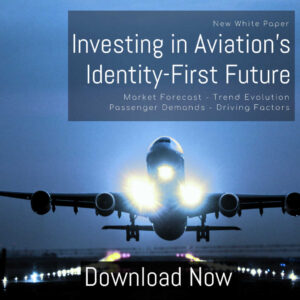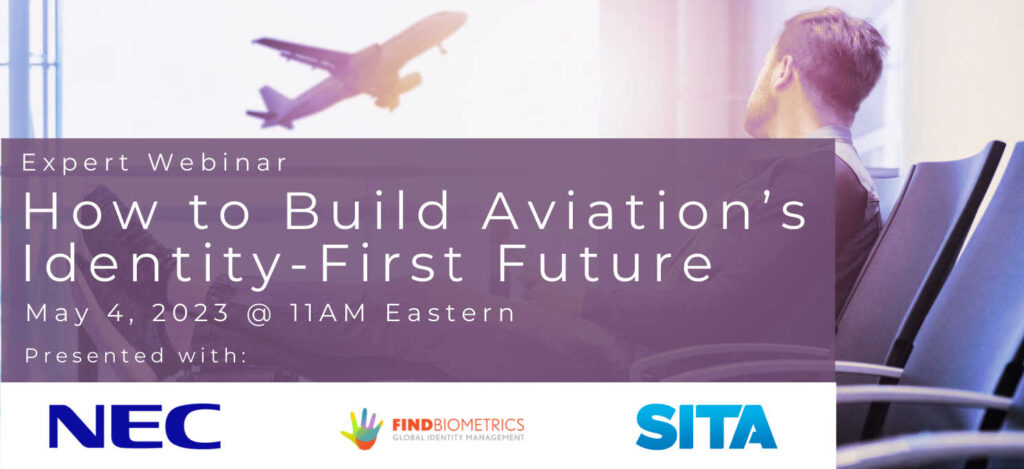
The travel and hospitality sector is a among the hottest markets for biometrics and digital identity, representing a rich, global ecosystem that depends on trust, interoperability, and secure identity. In the wake of the pandemic-induced travel shutdowns, people are taking back to the skies, driving a new passenger-experience focused paradigm for air travel with the goal of secure and streamlined aviation.
In this new frontier for aviation, NEC is a pioneer. FindBiometrics recently spoke with Jason Van Sice, Vice President, Advanced Recognition Systems, NEC Corporation of America, about the current state of aviation, the technologies transforming air travel experiences, and the findings of a new NEC white paper, “Investing in Aviation’s Identity-First Future,” which features market research from Acuity Market Intelligence and FindBiometrics.
FindBiometrics (FB): NEC published an eBook about investing in aviation’s identity-first future ahead of this year’s PTE conference in Amsterdam. Based on your experience at PTE, what is the current state of air travel? And why is now the time to invest in digital identity technologies for aviation?
Jason Van Sice, Vice President, Advanced Recognition Systems, NEC Corporation of America (NEC): Aviation is a dynamic industry, constantly facilitating travel and evolving with the demands of passengers and regulations. Identity technology is a critical aspect of the air travel ecosystem and has been adapting to the sector for decades.
With an anticipated, 4.1 billion travelers expected to fly in 2023, airports and airlines face operational challenges as they strive to meet passenger demand. Digitization technologies, including artificial intelligence (AI) and analytics, are being explored to further automate procedural coordination with identity.
Aviation is rebounding to pre-pandemic volumes rapidly, and digital identity is already playing an integral role in enablement. NEC is playing a key leadership role in digital transformation worldwide. Our technology continues to lead the market with cloud-native, state-of-the-art digital ID, AI, and analytics solutions. The experience we have gained through continuous integration across a diverse install base allows us to quickly innovate airports and airlines.
The current global market for aviation biometric digital ID is valued at $1.4 billion, projected to grow at a compound annual growth rate of 73 percent over the next five years, reaching $12.9 billion in 2027. This reflects a total addressable market of $63.4 billion from 2023 through 2027.

FB: The passenger experience envisioned by NEC is seamless, secure, and adaptive. What technologies are making this possible and how do they support each other?
NEC: According to SITA, the world’s leading aviation IT services provider with deployments in over 200 countries and an important NEC strategic partner, passengers’ most pressing pain points are health checks, security screening, and bag collection, which are often manual, time-consuming, and out of their control. These processes are the areas seeing the highest levels of innovation, and therefore, the greatest rate of improvement.
Through NEC’s partnership with SITA, the combined solution can leverage our respective expertise to further enhance these processes, amongst others, to bring efficiencies and security benefits provided by digital ID capabilities for the traveling public, airlines, and airports. The future of aviation will be facilitated by the “Big 3” companies on the Biometric Digital Identity Prism, fueled by technology, partnerships, and expertise.
FB: As airports and airlines look for digital identity solutions to enable delightful passenger experiences, what are the key differentiators they should look for? Given how much these platforms influence security and passenger experience in airports, are there any pitfalls stakeholders should avoid?
NEC: The most important key differentiators should be obvious for any decision maker: real-world experience, supplier reputation, solution architecture, and size and breadth of a potential supplier. NEC is heavily focused and engaged on remaining at the edge of innovation to include cloud-native solutions to enable easily deployed identity and analytics-oriented solutions optimized using AI and machine learning across a number of capabilities at the edge. All while maintaining a customer experience focus for intuitive, easy-to-use products.
Key Benefits of the NEC I:Delight Platform:
• Agnostic and Interoperable
• Optimizable for maximum efficiency
• Analytics rich for data-driven insights
• Built-in privacy to protect user information
• Seamless delivery for a smooth user experience
ROI (Return on Investment):
• Increased operational speed and passenger throughput
• Cost savings on hardware
• Verification revenue
The versatility of digital ID deployments has significant implications for society, with advancement in connectivity, Internet of Things (IoT), and other Smart City technologies making everyday life safer and easier for work, travel, leisure, and home life.
However, there is a risk that without Digital ID as the foundation of a smart society, transactions may become burdensome due to constant re-enrollment for each new transaction type, leading to a cluttered identity landscape.
With a scalable and interoperable platform-based approach to digital ID, centered around user control of their data, the smart cities of tomorrow will be able to accommodate and empower people while safeguarding their privacy.
FB: With global passenger volumes set to return to pre-pandemic levels in 2023, it seems like there is a ticking clock on implementing digital ID in aviation. When can we expect to see passenger journeys improve in the way described in your latest eBook? And what parts of the passenger journey will be the first to embrace digital ID processes?
NEC: With global passenger volumes expected to return to pre-pandemic levels in 2023, the implementation of digital ID in aviation is time sensitive. Digital ID technologies are revolutionizing airport passenger processing, addressing the complexity and inconvenience of security checks and protocols.
The NEC I:Delight ID management platform utilizes biometrics and document validation to authenticate a user’s identity and create a Digital ID through an airline or airport’s app. This Digital ID can then be used for check-in, bag drop, security screening, and boarding, automating these cumbersome aspects of the airport experience.
Customers can opt-in and self-enroll using their mobile device, and have control over how, when, and where their Digital ID can be used, during travel days, flights, and airport services. The platform follows a privacy-by-design approach, protecting personal information, and provides users with a completely transparent view of the services they have selected, with the ability to opt out easily at any time.
Customer Uses Cases:
- Delta Air Lines
- Star Alliance
- SITA – Miami International Airport (MIA)
- Lufthansa
- United Airlines
FB: How can readers contact you to learn more about aviation’s identity-first future?
NEC: Aviation is returning to full force and digital identity is already playing an integral role in enabling a safer and more convenient future for air travel. NEC is ready to elevate airports, airlines, and the passenger journey. To learn more, visit www.necam.com/IDelight/Aviation to see how NEC I:Delight combines digital technologies to interconnect people and processes in aviation and beyond.
This Conversation Continues May 4, 2023, in “How to Build Aviation’s Identity-First Future”
Sign-up for this expert webinar taking place on May 4 at 11 AM Eastern. Join Jason Van Sice, VP Advanced Recognition Systems, NEC Corporation of America, and Sherry Stein, CTO, SITA Americas in conversation with FindBiometrics Editor in Chief Peter Counter as they discuss:
- How digital ID plays a role in the current air travel landscape
- What digital identity technologies are transforming the passenger experience
- Why privacy, interoperability, and collaboration are crucial in digital ID for aviation
- The first steps you can take to start building aviation’s identity-first future today
Register now and receive a free aviation eBook: Investing in Aviation’s Identity-First Future.








Follow Us